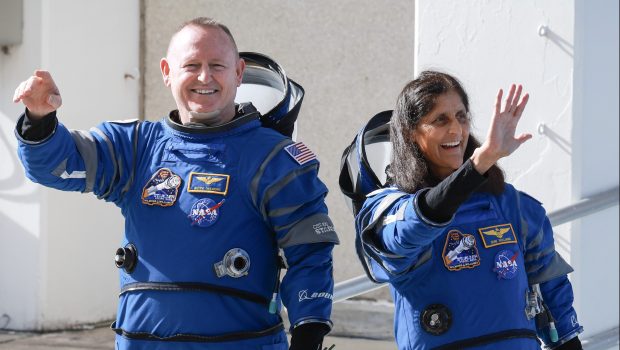Starliner Astronauts’ Families Speak Out on ‘Stranded’ Status

When Boeing’s Starliner capsule launched on June 5, astronauts Sunita Williams and Butch Wilmore were only supposed to be in space for an estimated eight days.
However, after experiencing thruster failures and helium leaks before safely docking at the International Space Station (ISS), NASA decided to postpone the pair’s return to Earth—potentially delaying it until February 2025.
“You know we probably don’t expect him until February, February or March,” said Wilmore’s wife, Deanna.
Wilmore, who shares two daughters—19-year-old Daryn and 16-year-old Logan—with Deanna, has been able to Facetime his family several times a day from the ISS.
“It is so cool. He gives us a lot of Earth views. I especially like seeing the sunset,” said his eldest daughter.
Deanna added, “He just takes it knowing the Lord’s in control, and since the Lord’s in control of it, he’s content where he is.”
“You just sort of have to roll with it and expect the unexpected.”
Suni’s husband, Michael Williams, mentioned last week that he didn’t think she was disappointed to spend more time at the space station, telling The Wall Street Journal, “That’s her happy place.”
NASA’s chief astronaut, Joe Acaba, stated at a media teleconference on Aug. 14, “If Butch and Suni do not come home on Starliner and they are kept aboard the station, they will have about eight months on orbit.”
He added, “We have done multiple successful, long-duration missions, even up to a year.”
It remains uncertain whether Wilmore and Williams will have to spend six more months in space or if they’ll return home with another crew in September. The latter option, which NASA would be reluctant to pursue, is for the duo to hitch a ride back to Earth on SpaceX’s Crew Dragon, operated by Elon Musk’s company.
Switching to SpaceX would require bumping two of the four astronauts assigned to the next ferry flight, currently targeted for late September. Wilmore and Williams would take the empty seats in SpaceX’s Dragon capsule once that half-year mission ends—requiring the two astronauts to stay on the ISS for an additional six months until February 2025.
“That mantra you’ve heard, ‘failure is not an option,’ that’s why we are staying here now,” Wilmore said.
“We trust that the tests we’re doing are the ones we need to get the right answers, to give us the data we need to come back.”